Within Christianity, there are a variety of views on sexual orientation and homosexuality. The view that various Bible passages speak of homosexuality as immoral or sinful emerged through its interpretation and has since become entrenched in many Christian denominations through church doctrine and the wording of various translations of the Bible.
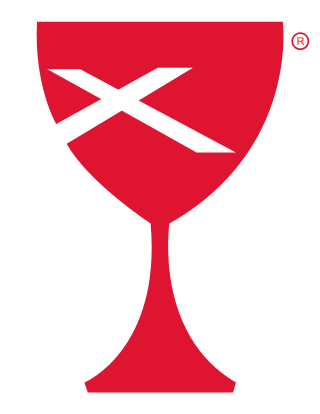
The Christian Church (Disciples of Christ) is a mainline Protestant Christian denomination in the United States and Canada. The denomination started with the Restoration Movement during the Second Great Awakening, first existing during the 19th century as a loose association of churches working towards Christian unity, then slowly forming quasi-denominational structures through missionary societies, regional associations, and an international convention. In 1968, the Disciples of Christ officially adopted a denominational structure at which time a group of churches left to remain nondenominational.

The Reformed Church in America (RCA) is a mainline Reformed Protestant denomination in Canada and the United States. It has about 84,957 members. From its beginning in 1628 until 1819, it was the North American branch of the Dutch Reformed Church.

The United Church of Christ (UCC) is a socially liberal mainline Protestant Christian denomination based in the United States, with historical and confessional roots in the Congregational, Restorationist, Continental Reformed, and Lutheran traditions, and with approximately 4,600 churches and 712,000 members. The UCC is a historical continuation of the General Council of Congregational Christian churches founded under the influence of New England Puritanism. Moreover, it also subsumed the third largest Calvinist group in the country, the German Reformed. Notably, its modern members' theological and socio-political stances are often very different from those of its predecessors.
The Confessing Movement is a largely lay-led theologically conservative Christian movement that opposes the influence of theological liberalism and theological progressivism currently within several mainline Protestant denominations and seeks to return those denominations to its view of orthodox doctrine or to form new denominations and disfellowship (excommunicate) them if the situation becomes untenable. Those who eventually deem dealing with theological liberalism and theological progressivism within their churches and denominations as not being tenable anymore would later join or start Confessional Churches and/or Evangelical Churches that continue with the traditions of their respective denominations and maintaining orthodox doctrine while being ecclesiastically separate from the Mainline Protestant denominations.
The Pacific School of Religion (PSR) is a private Protestant seminary in Berkeley, California. It maintains covenantal relationships with the United Church of Christ, the United Methodist Church, and the Disciples of Christ, ensuring the school provides the necessary requirements for candidates to seek ordination within these denominations. These three denominations account for approximately half of the student population of PSR. The school has also maintained close relationships with the Unitarian Universalist Association, the Universal Fellowship of Metropolitan Community Churches, the African Methodist Episcopal Church, as well as other denominations. Over the years PSR has provided training for clergy and leaders from a wide range of religious traditions including Buddhists, Jews, Pagans, Pentecostals, and Roman Catholics.
Open and Affirming (ONA) is an official designation of congregations and other settings in the United Church of Christ (UCC) affirming the full inclusion of gay, lesbian, bisexual, transgender and non-binary persons (LGBTQ) in the church's life and ministry.
Chris Glaser has been an activist in the movement for full inclusion of LGBT Christians in the Presbyterian Church (U.S.A.), or PCUSA, for over 30 years. He is currently a minister in the Metropolitan Community Church, or MCC.

The Reconciling Ministries Network (RMN) is an organization seeking the inclusion of people of all sexual orientations and gender identities in both the policy and practices of United Methodist Church. It is one of many Welcoming Congregation organizations to emerge in American Christianity in the 1980s. The ministry has over 1100 affiliated congregations and 42,000 affiliated individuals.
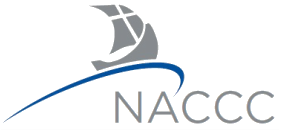
The National Association of Congregational Christian Churches (NACCC) is an association of 304 churches providing fellowship for and services to churches from the Congregational tradition. The Association maintains its national office in Oak Creek, Wisconsin, a suburb of Milwaukee. The body was founded in 1955 by former clergy and laypeople of the Congregational Christian Churches in response to that denomination's pending merger with the Evangelical and Reformed Church to form the United Church of Christ in 1957.
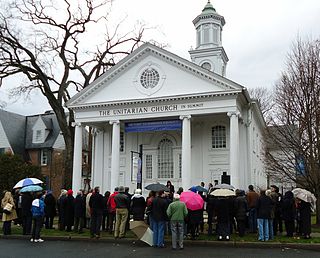
Unitarian Universalism, as practiced by the Unitarian Universalist Association (UUA), and the Canadian Unitarian Council (CUC), is a non-Creedal and Liberal theological tradition and an LGBTQ affirming denomination.
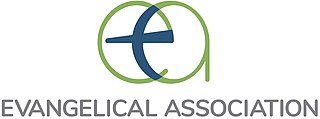
The Evangelical Association of Reformed and Congregational Christian Churches is an evangelical protestant denomination in the United States. It began as a fellowship of churches disaffected from the United Church of Christ due to that denomination's liberal theology. Churches of the Evangelical Association are free to hold dual affiliation with another denomination, as local churches observe congregational polity.
Methodist viewpoints concerning homosexuality are diverse because there is no one denomination which represents all Methodists. The World Methodist Council, which represents most Methodist denominations, has no official statements regarding sexuality. Various Methodist denominations themselves take different stances on the issue of homosexuality, with many denominations holding homosexual practice to be sinful, while other denominations ordain LGBT clergy and marry same-sex couples. The positions of the various Methodist denominations around the globe are outlined in this article.

Sally Miller Gearhart was an American teacher, feminist, science-fiction writer, and political activist. In 1973, she became the first open lesbian to obtain a tenure-track faculty position when she was hired by San Francisco State University, where she helped establish one of the first women and gender study programs in the country. She later became a nationally known gay rights activist.
Extraordinary Lutheran Ministries (ELM), founded on October 31, 2007, is an organization committed to the full participation of persons of all sexual orientations and gender identities in the life and ministry of the Lutheran church.
The ordination of lesbian, gay, bisexual and/or transgender (LGBT) clergy who are open about their sexuality or gender identity; are sexually active if lesbian, gay, or bisexual; or are in committed same-sex relationships is a debated practice within some contemporary Christian denominations.
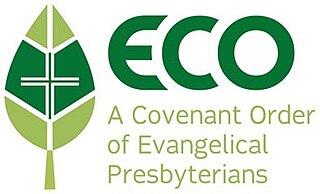
ECO: A Covenant Order of Evangelical Presbyterians is an evangelical Presbyterian denomination in the United States. As a Presbyterian church, ECO adheres to Reformed theology and Presbyterian polity. It was established in 2012 by former congregations and members of the Presbyterian Church (USA), abbreviated PC(USA). Denominational disputes over theology—particularly ordination of practicing homosexuals as pastors and gay marriage—and bureaucracy led to the founding of ECO. In 2018, ECO has over 383 congregations, 103,425 covenant partners and over 500 pastors. ECO churches are egalitarian in beliefs and ordain women as pastors and elders.
The Calvin Synod is an acting conference of the United Church of Christ, composed entirely of Reformed, or Calvinist congregations of Hungarian descent. Unlike much of the UCC, the Synod is strongly conservative on doctrinal and social matters, and many members of the "Faithful and Welcoming Movement," a renewal group acting to move the UCC in a more orthodox direction, belong to this body.









